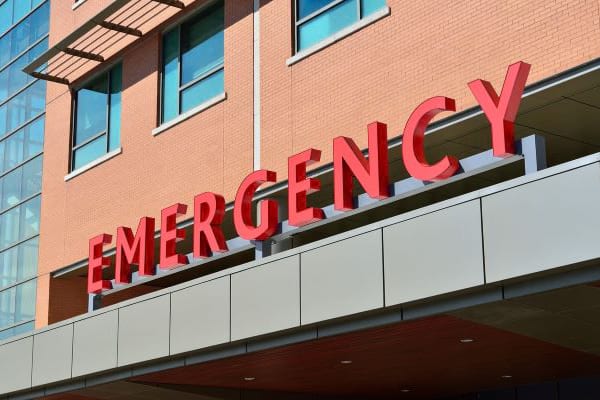Skip To Section
Drug overdoses are one of the scariest risks associated with substance use, and, unfortunately, they happen frequently. There were nearly 70,000 drug overdoses in the United States in 2018 alone. That figure breaks down to 128 people every single day.
It’s important for people to know the signs, risk factors, and how the body can recover from an overdose.
A drug overdose is a medical emergency that requires immediate intervention.

What Happens When You Overdose?
A drug overdose occurs when you take more of a drug than your body can process. You may not recognize that you’re overdosing when it’s happening.
In general, different drugs affect different parts of the brain. Depending on the drug, overdose symptoms vary, but they can include nausea, confusion, loss of consciousness, and difficulty breathing. Overdoses can also result in serious health complications such as heart attack, stroke, or organ failure.
One of the biggest risk factors for a drug overdose is when multiple substances are used at the same time. This is known as polysubstance abuse and it increases your chances of experiencing an overdose. Mixing drugs can also cause dangerous interactions within the body, leading to unpredictable effects and potential overdose.
An overdose can happen with any type of drug – prescription medications, over-the-counter drugs, and even illegal substances. Drug overdoses are medical emergencies that require immediate intervention. If someone doesn’t get help soon enough, they can die.
Why Do Overdoses Happen?
Overdoses can happen for various reasons. Common ones include:
- Accidentally taking more of a substance than the body can handle – This becomes more likely if you’ve stopped taking that drug for a while. During that period, your tolerance for the drug decreases. If you then take the same dose that you were used to taking, you may increase the risk of overdosing.
- Accidentally mixing drugs – Street drugs are rarely pure. Many times, dealers “cut” drugs with cheaper ingredients to make them stronger. For instance, many dealers combine heroin with other synthetic opioids like fentanyl, a substance that’s 50-100x more potent than morphine. There’s no way of knowing how your body will react to this combination.
- Negative drug interactions – For example, mixing certain medications with alcohol can increase the risk of overdose. That’s why it’s important to understand drug interactions for any legal or illicit substance you take.
What Puts You at Risk of an Overdose?
You’re at risk of overdosing anytime you abuse a substance, but some things can increase the risk. These are called risk factors, and common ones include:
- Having an opioid use disorder
- Having medical conditions, like HIV or liver or lung disease
- Using the same amount of a drug after a sustained period of not having taken that drug
- Having a low level of physical tolerance
- Increasing the amount of the substance you’re using
- Becoming dependent on the drug
- Binging or taking a large amount of the drug in a short period
- Using drugs intravenously (directly into the veins)
- Having a history of suicide attempts
- Mixing drugs or taking multiple substances closely together
- Dropping out of substance abuse treatment prematurely
- Having a history of previous overdoses
- Being recently released from jail or prison
- Having co-occurring mental health conditions
According to the World Health Organization, men are more likely to overdose on opioids than women. People with a lower socioeconomic background are also at a higher risk.
"*" indicates required fields
Fill out the form below and one of our admissions team members will reach out to you:
"*" indicates required fields
Signs of an Overdose
Drug overdoses aren’t always apparent. Many assume that the person will sleep it off and be fine, but the reality is that an overdose can quickly turn fatal without proper intervention. This is why it’s important to educate yourself and recognize the signs of a drug overdose.
The first thing to understand is that an overdose occurs when someone takes too much of a drug or combination of drugs. This can happen intentionally or accidentally, and the consequences can be devastating. The main types of drugs involved in overdoses are opioids, stimulants, and depressants. These drugs affect the brain and body in different ways, but all can lead to overdose if taken in excessive amounts.
So how do you know if someone is experiencing an overdose? There are some general signs and symptoms to look out for, but it’s important to note that they can vary depending on the drug(s) involved. Some common signs of an overdose include:
- Difficulty breathing
- Irregular heart rate and/or blood pressure
- Extreme confusion
- Loss of consciousness
- Unresponsiveness
- Seizures
- Vomiting
If you suspect that someone is experiencing an overdose, it’s crucial to call 911 immediately. An overdose is a medical emergency and time is of the essence.
Overdosing on drugs or alcohol can have serious consequences, including:
- Respiratory failure
- Cardiac arrest
- Coma
- Death
It’s important to know the signs and symptoms of an overdose on different types of drugs, so you can protect yourself and your loved ones. Let’s look at what happens when you overdose on different substances.
Signs of Alcohol Poisoning and Overdose
Alcohol overdose symptoms may include:
- Confusion
- Loss of consciousness
- Vomiting
- Slow or irregular breathing
- Low body temperature
- Delirium
- Seizures
If you’re concerned someone is overdosing on alcohol, call 911. Don’t assume the person will sleep it off. Don’t leave an unconscious person alone. This may result in them choking on their own vomit. If they start vomiting, try to keep them in a seated position. If they remain lying down, turn their head to the side.
Signs of an Opioid Overdose
Opioid overdoses have become increasingly common in recent years. Opioid overdose symptoms include:
- Slowed or stopped breathing
- Blue lips or fingertips
- Pinpoint pupils
- Nausea and vomiting
- Dizziness
- Confusion
If you suspect someone has overdosed on opioids such as heroin or prescription painkillers like oxycodone or fentanyl, call 911 immediately and administer naloxone if available. Naloxone can help reverse opioid overdose effects. While waiting for paramedics, try to keep the person awake and conscious. Lay them on their side to avoid the risk of choking.
Signs of a Stimulant Overdose
Stimulant overdose symptoms may include:
- Rapid heartbeat and breathing rate
- High blood pressure
- Agitation
- Restlessness
- Panic attacks
- Hallucinations
- Psychosis
- Chest pain
- Heart attack
- Stroke
- Respiratory failure
- Seizure
If you suspect someone has overdosed on stimulants such as cocaine, methamphetamine or prescription medications like Adderall or Ritalin, call 911 immediately and provide as much information about the person’s condition and drug use as possible. In addition to calling for emergency medical assistance, try to keep the person calm and monitor their vital signs until help arrives.
How To Help Someone Overdosing On Drugs
To help someone overdosing on drugs, call 911 immediately. While waiting for help to arrive, there are some things you can do to help the person:
- If you suspect someone has taken opioids, or drugs laced with opioids, administer naloxone (Narcan) while waiting for emergency medical help.
- Try to keep them in an upright, seated position.
- If they are laying down, make sure the person is on their side in case they vomit. This will prevent choking and aspiration.
- Loosen any tight clothing around their neck and chest to improve their breathing.
- If the person is overheating, apply a cold towel to their forehead and wrists to help regulate body temperature.
- Monitor their breathing and pulse to watch for any changes or signs of distress. If their breathing or pulse stops, be prepared to perform CPR.
- Keep the person calm and reassure them that help is on the way.
- Do not restrain the person if they are having a seizure. Try to keep their head and limbs away from any objects that could result in injuries.
- Do not leave the person alone if they are unconscious.
If you notice any other symptoms such as chest pain, dizziness, or difficulty speaking, communicate these observations to the emergency responders when they arrive.
Remember to stay calm and focused in this stressful situation. Your actions can make a difference in helping someone who is experiencing a medical emergency.
Why You Need to Know What Good Samaritan Laws Are
Some people feel nervous about seeking medical attention because they don’t want the police to get involved. In response to this fear, 40 states and Washington, D.C. have passed “Good Samaritan” laws. These laws offer protection for low-level drug offenses and prevent the risk of legal repercussions if you call 911 to save a person’s life from an overdose.
This means that if you suspect someone is overdosing on any drug, you can call 911 immediately without fearing legal consequences. These laws are often living-saving because the faster someone gets help, the more likely they are to survive.
Recovering From an Overdose
Recovering from an overdose is a critical process that involves both immediate and long-term health interventions. Initially, emergency medical treatment is often required to address the acute symptoms of an overdose. This may include administering activated charcoal to absorb drugs in the stomach, using medications like naloxone to reverse opioid overdoses, or providing supportive care for breathing and heart function.
After stabilizing the person, detoxification is the next step where the body is allowed to rid itself of substances under medical supervision. Detox can vary in length and intensity depending on the substance involved and the individual’s condition. During this time, hydration and nutritional support are crucial as they help replenish the body and mitigate withdrawal symptoms.
Following detoxification, inpatient rehabilitation programs offer psychological support and drug addiction counseling to address underlying issues related to substance use. These programs can be inpatient or outpatient, depending on the severity of the addiction and overdose. Therapy sessions aim to equip individuals with coping strategies to prevent future relapses.
Seeking Treatment After a Drug Overdose
Overdoses can be intense wake-up calls. For many people, they act as a catalyst for entering treatment. At Footprints to Recovery, we’re here to help you get back on your feet. No matter your circumstances or your past, we’re to support you. Contact us today to learn more.
- Drug and Opioid-Involved Overdose Deaths — United States, 2017–2018 | MMWR
- Fentanyl DrugFacts | National Institute on Drug Abuse (NIDA)
- Harmful Interactions | National Institute on Alcohol Abuse and Alcoholism (NIAAA)
- Opioid overdose – WHO
- Alcohol poisoning – Symptoms and causes – Mayo Clinic
- Cocaine | National Institute on Drug Abuse (NIDA)
- Know the Risks of Meth | SAMHSA
- Opioid Overdose: MedlinePlus
- Good Samaritan Overdose Prevention Laws
Our admissions team is available 24/7 to listen to your story and help you get started with the next steps.









